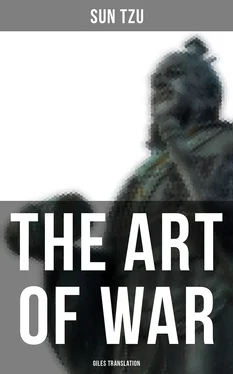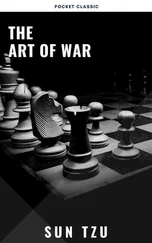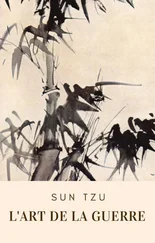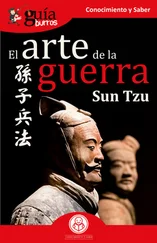56. Bestow rewards without regard to rule, issue orders without regard to previous arrangements; and you will be able to handle a whole army as though you had to do with but a single man.
57. Confront your soldiers with the deed itself; never let them know your design. When the outlook is bright, bring it before their eyes; but tell them nothing when the situation is gloomy.
58. Place your army in deadly peril, and it will survive; plunge it into desperate straits, and it will come off in safety.
59. For it is precisely when a force has fallen into harm's way that is capable of striking a blow for victory.
60. Success in warfare is gained by carefully accommodating ourselves to the enemy's purpose.
61. By persistently hanging on the enemy's flank, we shall succeed in the long run in killing the commander-in-chief.
62. This is called ability to accomplish a thing by sheer cunning.
63. On the day that you take up your command, block the frontier passes, destroy the official tallies, and stop the passage of all emissaries.
64. Be stern in the council-chamber, so that you may control the situation.
65. If the enemy leaves a door open, you must rush in.
66. Forestall your opponent by seizing what he holds dear, and subtly contrive to time his arrival on the ground.
67. Walk in the path defined by rule, and accommodate yourself to the enemy until you can fight a decisive battle.
68. At first, then, exhibit the coyness of a maiden, until the enemy gives you an opening; afterwards emulate the rapidity of a running hare, and it will be too late for the enemy to oppose you.
TOC
1. Sun Tzu said: There are five ways of attacking with fire. The first is to burn soldiers in their camp; the second is to burn stores; the third is to burn baggage trains; the fourth is to burn arsenals and magazines; the fifth is to hurl dropping fire amongst the enemy.
2. In order to carry out an attack, we must have means available. The material for raising fire should always be kept in readiness.
3. There is a proper season for making attacks with fire, and special days for starting a conflagration.
4. The proper season is when the weather is very dry; the special days are those when the moon is in the constellations of the Sieve, the Wall, the Wing or the Cross-bar; for these four are all days of rising wind.
5. In attacking with fire, one should be prepared to meet five possible developments:
6. (1) When fire breaks out inside to enemy's camp, respond at once with an attack from without.
7. (2) If there is an outbreak of fire, but the enemy's soldiers remain quiet, bide your time and do not attack.
8. (3) When the force of the flames has reached its height, follow it up with an attack, if that is practicable; if not, stay where you are.
9. (4) If it is possible to make an assault with fire from without, do not wait for it to break out within, but deliver your attack at a favorable moment.
10. (5) When you start a fire, be to windward of it. Do not attack from the leeward.
11. A wind that rises in the daytime lasts long, but a night breeze soon falls.
12. In every army, the five developments connected with fire must be known, the movements of the stars calculated, and a watch kept for the proper days.
13. Hence those who use fire as an aid to the attack show intelligence; those who use water as an aid to the attack gain an accession of strength.
14. By means of water, an enemy may be intercepted, but not robbed of all his belongings.
15. Unhappy is the fate of one who tries to win his battles and succeed in his attacks without cultivating the spirit of enterprise; for the result is waste of time and general stagnation.
16. Hence the saying: The enlightened ruler lays his plans well ahead; the good general cultivates his resources.
17. Move not unless you see an advantage; use not your troops unless there is something to be gained; fight not unless the position is critical.
18. No ruler should put troops into the field merely to gratify his own spleen; no general should fight a battle simply out of pique.
19. If it is to your advantage, make a forward move; if not, stay where you are.
20. Anger may in time change to gladness; vexation may be succeeded by content.
21. But a kingdom that has once been destroyed can never come again into being; nor can the dead ever be brought back to life.
22. Hence the enlightened ruler is heedful, and the good general full of caution. This is the way to keep a country at peace and an army intact.
TOC
1. Sun Tzu said: Raising a host of a hundred thousand men and marching them great distances entails heavy loss on the people and a drain on the resources of the State. The daily expenditure will amount to a thousand ounces of silver. There will be commotion at home and abroad, and men will drop down exhausted on the highways. As many as seven hundred thousand families will be impeded in their labor.
2. Hostile armies may face each other for years, striving for the victory which is decided in a single day. This being so, to remain in ignorance of the enemy's condition simply because one grudges the outlay of a hundred ounces of silver in honors and emoluments, is the height of inhumanity.
3. One who acts thus is no leader of men, no present help to his sovereign, no master of victory.
4. Thus, what enables the wise sovereign and the good general to strike and conquer, and achieve things beyond the reach of ordinary men, is foreknowledge.
5. Now this foreknowledge cannot be elicited from spirits; it cannot be obtained inductively from experience, nor by any deductive calculation.
6. Knowledge of the enemy's dispositions can only be obtained from other men.
7. Hence the use of spies, of whom there are five classes: (1) Local spies; (2) inward spies; (3) converted spies; (4) doomed spies; (5) surviving spies.
8. When these five kinds of spy are all at work, none can discover the secret system. This is called "divine manipulation of the threads." It is the sovereign's most precious faculty.
9. Having local spies means employing the services of the inhabitants of a district.
10. Having inward spies, making use of officials of the enemy.
11. Having converted spies, getting hold of the enemy's spies and using them for our own purposes.
12. Having doomed spies, doing certain things openly for purposes of deception, and allowing our spies to know of them and report them to the enemy.
13. Surviving spies, finally, are those who bring back news from the enemy's camp.
14. Hence it is that which none in the whole army are more intimate relations to be maintained than with spies. None should be more liberally rewarded. In no other business should greater secrecy be preserved.
15. Spies cannot be usefully employed without a certain intuitive sagacity.
16. They cannot be properly managed without benevolence and straightforwardness.
17. Without subtle ingenuity of mind, one cannot make certain of the truth of their reports.
18. Be subtle! be subtle! and use your spies for every kind of business.
19. If a secret piece of news is divulged by a spy before the time is ripe, he must be put to death together with the man to whom the secret was told.
20. Whether the object be to crush an army, to storm a city, or to assassinate an individual, it is always necessary to begin by finding out the names of the attendants, the aides-de-camp, and door-keepers and sentries of the general in command. Our spies must be commissioned to ascertain these.
21. The enemy's spies who have come to spy on us must be sought out, tempted with bribes, led away and comfortably housed. Thus they will become converted spies and available for our service.
Читать дальше












